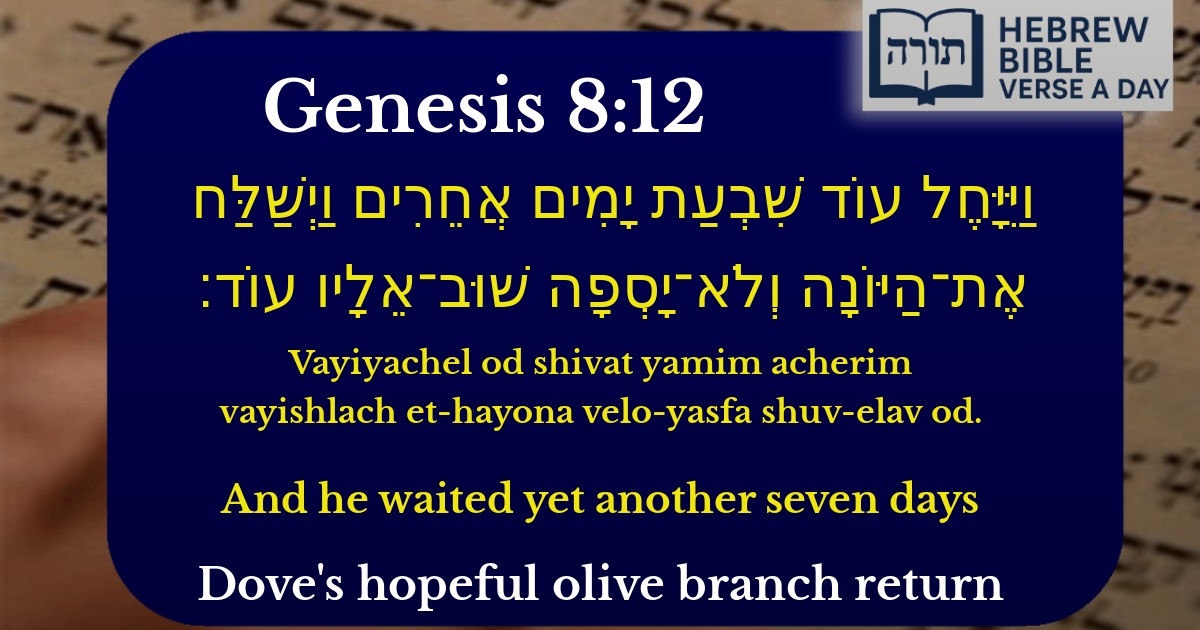Frequently Asked Questions
Q: What does Genesis 8:12 mean when it says Noah waited 'another seven days'?
A: This verse refers to Noah waiting an additional seven days after initially sending out the dove (Genesis 8:10). According to Rashi, this shows Noah's patience and careful observation of God's timeline. The seven-day intervals reflect the orderly process of creation (which also took seven days) and demonstrate that the world was being recreated after the flood.
Q: Why did Noah send out the dove a second time in Genesis 8:12?
A: Noah sent the dove a second time to confirm that the floodwaters had truly receded and the land was habitable. The Talmud (Sanhedrin 108b) explains that Noah was being cautious and wanted clear signs before leaving the ark. When the dove didn't return, it was proof that it found dry land and food, showing God's promise was fulfilled.
Q: What lesson can we learn from Noah waiting seven days in Genesis 8:12?
A: The Midrash teaches that Noah's seven-day wait shows the importance of patience and trusting in God's timing. Just as creation unfolded over seven days, redemption comes in proper stages. This teaches us to have faith during difficult times and wait for God's plan to unfold, rather than rushing ahead with our own understanding.
Q: How does the number seven in Genesis 8:12 connect to other parts of the Torah?
A: The number seven appears frequently in Torah as a symbol of completion and holiness (Shabbat, shemittah, etc.). Ramban explains that Noah's seven-day intervals mirror the seven days of creation, showing that the flood was a reset for the world. This pattern reminds us that God's world operates with divine order and purpose.
Q: Why is it significant that the dove didn't return in Genesis 8:12?
A: Rashi explains that when the dove didn't return, it was a clear sign that the earth was now habitable. Unlike the raven (which kept returning), the dove's non-return showed it found dry land and food. This demonstrated God's mercy in restoring the world, allowing Noah and his family to finally leave the ark and rebuild civilization.


Understanding the Verse in Context
The verse (Bereshit 8:12) describes Noach's actions after the flood, where he waits an additional seven days before sending the dove again. This follows the earlier sending of the dove (Bereshit 8:10), where it returned with an olive leaf. Rashi explains that the "seven days" correspond to the time between one Shabbat and the next, indicating a divinely ordained cycle of waiting.
Rashi's Commentary
Rashi (Bereshit 8:10) notes that the phrase "וַיִּיָּחֶל עוֹד שִׁבְעַת יָמִים אֲחֵרִים" ("And he waited yet another seven days") teaches that Noach observed a consistent pattern of patience, waiting a full week between each attempt to send the dove. This mirrors the seven days of mourning or other significant periods in Torah, emphasizing the importance of measured, deliberate action.
Symbolism of the Dove
The Midrash (Bereshit Rabbah 33:6) elaborates on the dove's role as a messenger of peace and renewal. The fact that the dove did not return ("וְלֹא־יָסְפָה שׁוּב־אֵלָיו עוֹד") signifies that the earth had finally dried, and life could begin anew. The Ramban adds that this demonstrated Hashem's mercy in restoring the world after the flood.
Halachic Implications
The Talmud (Sanhedrin 108b) derives from this episode that Noach was meticulous in following divine instruction, waiting the exact time prescribed before acting. This serves as a model for adherence to mitzvot with precision and patience.